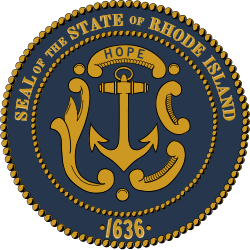| |||||||||||||||||
| |||||||||||||||||
 County results Smith: >90% | |||||||||||||||||
| |||||||||||||||||
| Elections in Rhode Island |
|---|
 |
A gubernatorial election was held in Rhode Island on April 5, 1865. The National Union incumbent governor James Y. Smith was re-elected against token opposition. [1]
Contents
Smith, a Radical Republican, won the 1863 Rhode Island gubernatorial election and was re-elected in 1864. [2] His nearest opponent was the former state senator Edward Harris, an abolitionist and temperance supporter who ran on the Equal Rights ticket. [3]
